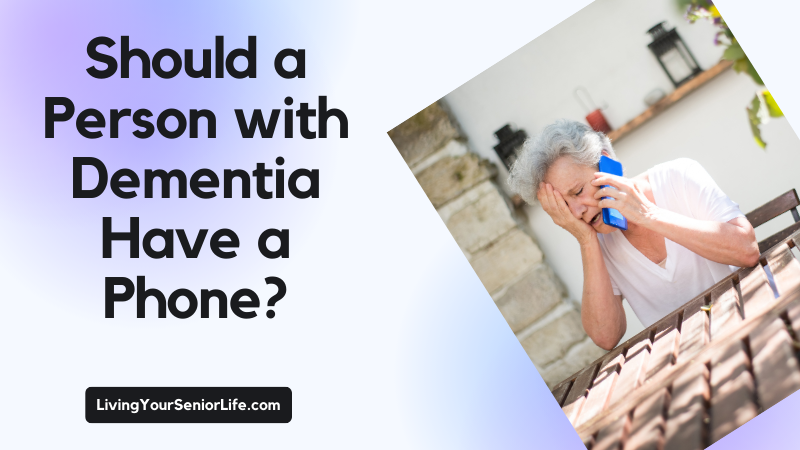As dementia progresses, it can become increasingly challenging to maintain independence and safety. One common question that arises is should a person with dementia have a phone? Phones are vital communication tools, but they can also present unique challenges for those with cognitive impairments. In this article, we’ll explore the pros and cons of phone usage for individuals with dementia and provide some practical tips for making the best decision for your loved one.
Key Takeaways:
- Phones should meet the unique needs of dementia patients and ensure safety.
- Devices like the raz memory cell phone and Jitterbug Flip are suitable for older adults with dementia.
- Crucial features include large buttons, simple user interfaces, and emergency services.
Deciding whether a person with dementia should have a phone can be challenging. Yes, people with dementia should have phones, provided it fits their unique needs and ensures their safety. Maintaining communication with family members is crucial, and having a phone can help achieve that. Phones allow dementia patients to make emergency calls, receive important phone calls and text messages, and stay engaged with the outside world.
Understanding Dementia
Dementia involves a significant decline in cognitive function that disrupts daily living. You may notice issues with memory, thinking, and understanding. Conditions like Alzheimer’s disease cause such impairments. Dementia can also affect language, judgment, and learning ability. Cognitive changes lead to challenges, especially for older adults dealing with memory loss and confusion.
Video: Should a Person with Dementia Have a Phone?
Pros of a Person with Dementia Having a Phone

Phones can be vital tools in dementia care by helping patients keep in touch with loved ones and ensuring their safety and well-being. They provide a lifeline for communication and can be tailored to meet specific needs.
Maintaining Connections with Friends and Family
Keeping in touch with family members and friends is crucial for individuals with dementia. Simple-to-use cell phones can help them easily make calls. Mobile phones with large, easy-to-read buttons and voice command can be very beneficial.
Phones help maintain social connections with family and friends, enhancing their emotional well-being and reducing feelings of isolation. Regular voice calls can also help monitor their well-being.
| Feature | Benefit |
|---|---|
| Large Buttons | Easier to enter phone numbers. Especially important if suffering vision loss |
| Voice Command | Simplifies making calls |
| Simple Interface | Reduces confusion and frustration |
Enhancing Safety and Health
Having a phone allows someone with dementia to call for help in emergencies. Whether it’s contacting a family member or dialing emergency services, a phone is a crucial lifeline. This provides peace of mind for both patients and caregivers.
Cell phones can be programmed to limit outgoing and incoming calls, preventing random or repeated calls that may cause distress. By controlling call settings, you ensure that patients only communicate with trusted family members and caregivers.
Phones can also serve as health management tools. With proper settings, they can receive medication reminders and scheduled health check calls. This helps them follow their health regimen and get timely medical attention if needed.
Monitoring and Tracking
Modern phones with GPS capabilities can track the person’s location. This feature is invaluable if the individual tends to wander. GPS tracking provides peace of mind to caregivers and family members.
Benefits of GPS Tracking:
- Helps locate missing individuals
- Provides real-time updates on location
- Assists caregivers in managing patient safety
Cell phones, tablets, and even landlines with tracking capabilities can be invaluable, ensuring the well-being and safety of those with dementia.
Drawbacks of a Dementia Patient Owning a Phone

Confusion and Anxiety
Using a phone can be particularly confusing for someone with dementia as the disease progresses. This confusion could cause significant frustration and anxiety. Navigating menus or simply remembering how to make a call can become difficult, resulting in increased stress for the individual.
Risk of Scams and Fraud
While phones help maintain connections, they also increase exposure to scams. Robocalls and other forms of fraud are common risks. Individuals with dementia are especially vulnerable. They may not recognize scam attempts and could fall victim to fraudsters.
Setting up a caregiver portal might help monitor calls and prevent anxiety from unsolicited numbers. Call-blocking features are also beneficial in minimizing fraud exposure. Reviewing their call history regularly, with consent, supports their security without reducing their independence.
Difficulty in Operation
Modern smart phones often have complex features and interfaces which can be overwhelming. For individuals with cognitive impairments, even simple tasks can become daunting. This difficulty may decrease their sense of independence and lead to frustration. Providing a phone with simpler functions might alleviate some of these issues.
Types of Phones Suitable for People with Dementia
Easy-to-Use Phones
Simplified phones are designed with large buttons and clear displays, making them easier for someone with dementia to operate. Models like the Jitterbug Flip2 focus on simplicity with fewer features to reduce confusion.
Phones with Location Tracking
Phones with GPS are essential for caregivers. They help track the person’s location, which is helpful if wandering is a concern. The RAZ Memory Cell Phone offers this function, providing peace of mind.
Emergency-Assistance Phones
Emergency phones come with features like SOS buttons for quick access to help. Devices like the Lively Flip allow users to call for assistance with one button press and often include additional features like the Lively Link app for caregivers.
Key Features to Look For In A Phone For Those With Dementia
Evaluating Ease of Use for Seniors
Usability is key when selecting the right phone. Opt for phones with large buttons over small buttons and look for a simple interface. This helps those with dementia navigate more easily.
A clear display and good camera quality can be important if video calls matter. Make sure the phone is light and easy to hold, which makes it easier to use.
Focus on features that promote independence while minimizing confusion. Features such as voice-activated calling and prompts are useful if memory problems affect the person.
Incorporate safety features like emergency call functions and GPS tracking. These features ensure that help is always within reach in case of emergencies.
Compatibility with hearing aids ensures clear communication for those with hearing impairments. A long battery life is also essential to avoid the need for frequent recharging.
Incorporate technology that supports daily tasks. For instance, remote management can allow caregivers to help manage the phone settings from afar.
Phones with internet-connected health monitoring devices offer real-time data on vital signs such as blood pressure, glucose, and heart rate. This helps in continuous health monitoring.
Devices with internet-enabled alarms help manage health tasks. For example, they can remind the person to drink water regularly, supporting overall well-being.
Look for advanced systems that offer cognitive exercises. These exercises improve memory retention and can be tailored to the user’s cognitive abilities, ensuring they are both engaging and beneficial.
Considering Cost and Pricing Options
When choosing the best phone for your loved one, think about your budget. Phones have a wide range of prices, so figure out how much you want to spend. Seek devices that offer good value, such as a large home screen and long-lasting battery power.
Affordable phones often work well. Check if there are any ongoing phone plans that fit your needs without being too costly. Prepaid plans or ones designed for older adults might be better suited.
Make sure the price includes essential features without unnecessary extras. It’s about balancing cost and functionality that will best serve the person with dementia.
Case Studies and Real-life Examples
Consider Jane’s experience. Her 83-year-old mother, diagnosed with early-stage dementia, faced challenges using a smartphone. Switching to a simplified phone with pre-programmed contacts helped her mother stay connected and independent.
Tom’s situation was different. His father, in the later stages of dementia, struggled with even basic phone use. Tom realized that his father’s phone added more stress than support.
Conclusion
Selecting the right cell phone for someone with dementia requires a careful assessment of their condition and needs. Phones can be crucial for safety and maintaining connections. However, they also present potential risks and challenges. Weighing the benefits and limitations, and considering options for simplified or specialized devices, can lead to a well-informed decision. Seeking advice from healthcare professionals can provide additional tailored insights.
We’d love to hear your experiences and thoughts on this topic. Have you found a phone to be helpful or challenging for a loved one with dementia? Share your stories in the comments below.
References and Further Reading
- Alzheimer’s Association. (2023). Dementia & Communication
- Mayo Clinic. (2023). Dementia: Symptoms & Causes
- National Institute on Aging. (2023). Caring for a Person with Dementia










